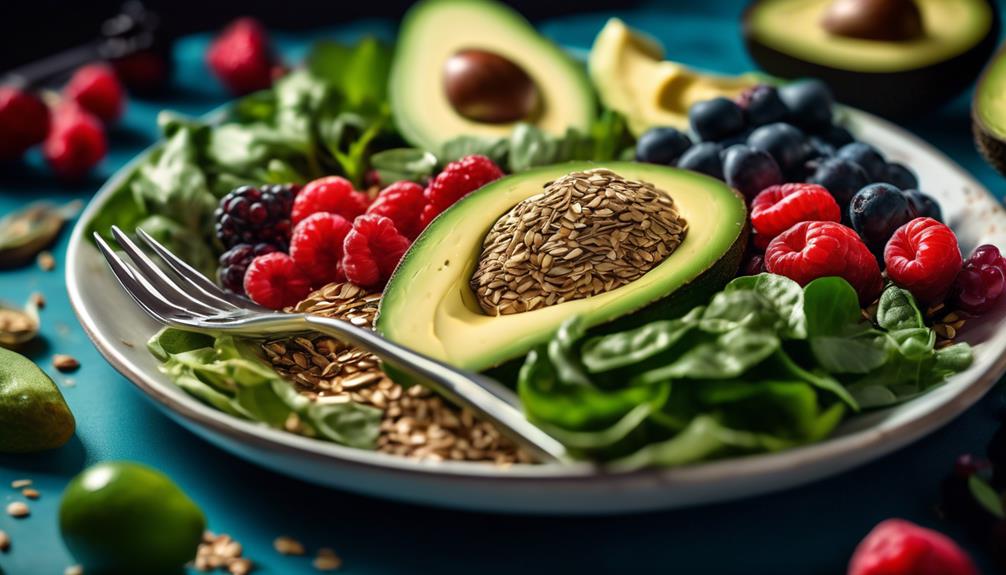Are you tired of battling with insulin sensitivity and struggling to find a sustainable solution?
Look no further, because we are here to provide you with the ultimate guide to managing your insulin levels through a ketogenic diet.
With 13 essential tips, we will help you understand the intricacies of insulin sensitivity and how to optimize it through the power of keto.
So, if you're ready to take control of your health and embark on a journey towards balanced blood sugar levels, join us as we unveil the key strategies for success.
Understanding Insulin Sensitivity

To understand insulin sensitivity, it's essential to grasp how your body responds to and utilizes the hormone insulin. Insulin is a hormone produced by your pancreas that helps regulate your blood sugar levels. When you eat carbohydrates, your body breaks them down into glucose, which enters your bloodstream. In response, your pancreas releases insulin to help transport glucose into your cells, where it can be used for energy or stored for future use.
Insulin sensitivity refers to how efficiently your cells respond to insulin. When your cells are insulin sensitive, they effectively take in glucose from your bloodstream. However, if your cells become resistant to insulin, a condition known as insulin resistance, glucose can't enter your cells efficiently, leading to high blood sugar levels.
Insulin signaling plays a crucial role in insulin sensitivity. When insulin binds to its receptors on the surface of your cells, it triggers a series of signaling events that promote glucose uptake. In insulin resistance, these signaling pathways become disrupted, impairing the ability of your cells to respond to insulin.
Understanding insulin sensitivity is important because it can impact your overall health. Insulin resistance is strongly associated with the development of type 2 diabetes and other metabolic disorders. By improving your insulin sensitivity through lifestyle modifications such as a healthy diet, regular physical activity, and maintaining a healthy weight, you can reduce your risk of developing these conditions and promote optimal health.
Getting Started With Keto
Are you ready to start your keto journey?
Understanding the benefits of the keto diet, knowing which foods are keto-friendly, and learning some meal planning tips are essential for getting started.
Benefits of Keto
One effective way to improve your overall health and insulin sensitivity is by adopting a ketogenic diet.
The benefits of weight loss are one of the key advantages of following a keto lifestyle. When you restrict carbohydrates and rely on fat as your primary source of fuel, your body enters a state of ketosis, where it burns stored fat for energy. This can lead to significant weight loss, especially in the abdominal area.
Additionally, a ketogenic diet has been shown to positively impact cholesterol levels. It tends to increase HDL (good) cholesterol while reducing levels of LDL (bad) cholesterol and triglycerides. These changes can help lower the risk of heart disease and improve overall cardiovascular health.
Incorporating a keto diet into your lifestyle can provide numerous benefits, including weight loss and improved cholesterol levels.
Keto-friendly Foods
Start your keto journey by incorporating a wide variety of delicious and nutritious keto-friendly foods into your diet.
Keto-friendly snacks and recipes can make your transition to a ketogenic lifestyle more enjoyable and sustainable.
When it comes to snacks, opt for options like almonds, macadamia nuts, and beef jerky, which are high in healthy fats and low in carbs.
For a quick and easy meal, try making a keto-friendly recipe like a cauliflower crust pizza or a zucchini noodle stir-fry. These recipes use low-carb substitutes for traditional ingredients, allowing you to indulge in your favorite dishes without compromising your ketosis.
Remember to focus on nutrient-dense, whole foods like avocados, eggs, and leafy greens to ensure you're getting the necessary vitamins and minerals while following a keto diet.
Meal Planning Tips
To effectively start your keto journey, begin by incorporating meal planning tips that will set you up for success in following a ketogenic lifestyle.
One crucial aspect of meal planning for keto is meal prep. Take some time each week to plan and prepare your meals in advance. This won't only save you time and effort during busy weekdays but also help you stay on track with your keto goals.
When meal prepping, focus on incorporating keto-friendly foods and recipes that are low in carbohydrates and high in healthy fats.
Another important aspect of meal planning is portion control. While following a keto diet, it's essential to be mindful of your serving sizes to maintain ketosis and insulin sensitivity.
Measuring and weighing your food can help you keep track of your macronutrient intake and ensure you stay within your desired calorie range.
Prioritizing Whole, Unprocessed Foods
Prioritizing whole, unprocessed foods is essential for improving insulin sensitivity and maintaining a healthy ketogenic diet. Whole foods, such as fruits, vegetables, lean proteins, and healthy fats, provide numerous benefits that can positively impact insulin sensitivity. These foods are rich in essential nutrients, fiber, and antioxidants, which can help regulate blood sugar levels and reduce inflammation in the body.
Including whole foods in your diet can also improve insulin sensitivity indicators, such as fasting blood sugar levels and insulin resistance. Studies have shown that consuming a diet rich in whole foods can lead to better insulin sensitivity and lower risk of developing type 2 diabetes.
When choosing whole foods, it's important to focus on quality and variety. Opt for organic, locally sourced options whenever possible to minimize exposure to pesticides and other harmful chemicals. Aim to incorporate a range of colorful fruits and vegetables, as different types contain unique antioxidants and phytochemicals that promote overall health and well-being.
In addition to prioritizing whole foods, it's also crucial to avoid processed and refined foods, as they're often high in added sugars, unhealthy fats, and artificial ingredients. These foods can contribute to insulin resistance and hinder your progress on a ketogenic diet.
Balancing Macronutrients for Optimal Insulin Regulation

To optimize insulin regulation, it's important to achieve a balance of macronutrients in your diet. One key aspect of this balance is to focus on balancing carbohydrates.
Carbohydrates have the most significant impact on blood sugar levels, so it's crucial to choose the right ones and consume them in moderation.
When it comes to carbohydrates, it's essential to prioritize complex carbs over simple carbs. Complex carbohydrates, such as whole grains, vegetables, and legumes, are digested more slowly, resulting in a slower release of glucose into the bloodstream. This helps to maintain stable blood sugar levels and prevents spikes in insulin.
On the other hand, simple carbohydrates, like refined sugars and processed foods, are rapidly broken down into glucose, leading to quick spikes in blood sugar levels. These spikes can overwhelm the body's insulin response and contribute to insulin resistance over time.
In addition to balancing carbohydrates, it's also important to pay attention to the overall macronutrient composition of your meals. A well-balanced meal should include a combination of carbohydrates, protein, and healthy fats. Including protein and fats in your meals can help slow down the digestion and absorption of carbohydrates, resulting in better blood sugar control.
Incorporating Healthy Fats Into Your Meals
Incorporating healthy fats into your meals can be a beneficial way to support optimal insulin sensitivity. When it comes to choosing healthy fat sources, it's important to focus on those that provide essential nutrients and promote overall health.
Some excellent sources of healthy fats include avocados, nuts and seeds, olive oil, and fatty fish like salmon. These foods are rich in monounsaturated and polyunsaturated fats, which have been shown to improve insulin sensitivity and reduce inflammation in the body.
However, it's also crucial to practice portion control when incorporating fats into your meals. While healthy fats are beneficial, they're also high in calories, and consuming too much can lead to weight gain and potential negative effects on insulin sensitivity.
Aim to include a moderate amount of healthy fats in each meal, such as a handful of nuts or a tablespoon of olive oil. This way, you can enjoy the benefits of healthy fats without overdoing it.
Including High-Fiber Foods in Your Diet

When it comes to optimizing your insulin sensitivity, one important aspect to consider is including high-fiber foods in your diet. High-fiber foods provide numerous benefits for your overall health, including improved digestion, weight management, and blood sugar control. In addition, they can help lower your risk of developing chronic diseases such as heart disease, diabetes, and certain types of cancer.
Fiber is a type of carbohydrate that can't be broken down by your body. Instead, it passes through your digestive system largely intact. This means that it doesn't raise your blood sugar levels or contribute to insulin resistance, making it an excellent choice for those following a keto diet.
To incorporate more fiber into your diet, focus on consuming a variety of fruits, vegetables, whole grains, legumes, and nuts. Some high-fiber options include raspberries, avocados, broccoli, chia seeds, and almonds. These foods can be easily incorporated into your keto meals and snacks.
Here are a few fiber-rich recipes to get you started:
- Chia Pudding: Combine chia seeds with coconut milk and your choice of low-carb sweetener for a delicious and fiber-packed dessert or breakfast option.
- Cauliflower Rice: Swap traditional rice for cauliflower rice to increase your fiber intake while enjoying a keto-friendly alternative.
- Black Bean Salad: Mix black beans, tomatoes, onions, and cilantro for a refreshing and high-fiber side dish.
Avoiding Added Sugars and Sweeteners
Cutting out added sugars and sweeteners is a crucial step in improving your insulin sensitivity and maintaining a healthy keto diet. When following a keto diet, it's important to be mindful not only of the obvious sources of sugar but also the hidden sugars that can sabotage your efforts.
Many processed foods, such as breakfast cereals, granola bars, and flavored yogurts, contain significant amounts of added sugars. Reading food labels carefully and avoiding products with ingredients like high fructose corn syrup, sucrose, or dextrose can help you steer clear of hidden sugars.
Understanding the glycemic index is another key aspect of avoiding added sugars and sweeteners. The glycemic index measures how quickly a particular food raises your blood sugar levels. Foods with a high glycemic index, like white bread, white rice, and sugary drinks, cause a rapid spike in blood sugar levels, leading to insulin resistance over time. Opting for foods with a low glycemic index, such as leafy greens, nuts, seeds, and berries, can help stabilize your blood sugar levels and improve insulin sensitivity.
In addition to avoiding added sugars and understanding the glycemic index, it's also essential to be cautious with artificial sweeteners. While they may not directly raise blood sugar levels, some studies suggest that artificial sweeteners can still negatively affect insulin sensitivity and even contribute to weight gain. It's best to limit your consumption of artificial sweeteners and opt for natural alternatives like stevia or erythritol, which have a minimal impact on blood sugar levels.
Monitoring Protein Intake for Insulin Control

Now let's talk about monitoring your protein intake for optimal insulin control.
Protein can have an effect on insulin levels, although to a lesser extent than carbohydrates.
It's important to find the right balance of protein in your diet to support your health goals.
Protein and Insulin Response
To optimize your insulin control, it's important to monitor your protein intake and its impact on insulin response. Protein quality plays a crucial role in managing insulin resistance. When it comes to protein, focus on high-quality sources such as lean meats, eggs, and dairy products. These provide essential amino acids that are easily absorbed by the body.
Unlike carbohydrates, protein has a minimal effect on blood sugar and insulin levels. However, excessive protein intake can stimulate insulin release, leading to potential insulin resistance. It's essential to strike a balance and consume an adequate amount of protein without overdoing it.
Aim for about 20-30% of your daily calorie intake from protein sources to support muscle growth and maintenance while maintaining insulin sensitivity. Regularly monitoring your protein intake can help you maintain optimal insulin control and support your overall health.
Optimal Protein Amount
When it comes to managing insulin control, it's important to pay attention to the optimal amount of protein you consume on a daily basis. Protein is an essential macronutrient that plays a crucial role in various bodily functions, including muscle repair and growth. However, consuming too much protein can lead to an increase in insulin levels, which may hinder your efforts to maintain insulin sensitivity.
To ensure you're consuming the right amount of protein, it's important to consider both protein sources and protein requirements. Opt for high-quality protein sources such as lean meats, poultry, fish, and plant-based proteins like tofu and legumes. The recommended protein intake for most individuals is around 0.8-1.2 grams of protein per kilogram of body weight.
Adjusting your protein intake based on your individual needs and goals can help optimize insulin control and support overall health.
Timing Protein Consumption
Monitoring your protein intake throughout the day can be a helpful strategy for optimizing insulin control. Research suggests that spreading your protein intake evenly throughout the day may be beneficial for maintaining stable blood sugar levels and optimizing insulin sensitivity. When you consume protein, it stimulates the release of insulin to help transport amino acids into your cells. However, consuming a large amount of protein in one sitting can lead to a more pronounced insulin response. By spreading your protein intake over multiple meals and snacks, you can potentially minimize the insulin spike that occurs after a meal.
To effectively time your protein consumption, aim to include a moderate amount of protein in each meal and snack throughout the day. This can help prevent overloading your system with protein and ensure a more balanced insulin response. Additionally, combining protein with healthy fats and fiber-rich foods can further slow down digestion and reduce the impact on blood sugar levels.
Practicing Intermittent Fasting

For improved insulin sensitivity, consider incorporating intermittent fasting into your keto lifestyle. Intermittent fasting is a dietary pattern that involves cycling between periods of fasting and eating. It has been shown to offer several benefits for overall health and can be particularly beneficial for individuals following a ketogenic diet.
One of the main benefits of intermittent fasting is its ability to improve insulin sensitivity. When you fast, your body depletes its glycogen stores and switches to using stored fat for energy. This helps to stabilize blood sugar levels and reduce insulin resistance, which is crucial for maintaining optimal insulin sensitivity.
To practice intermittent fasting, you can choose from various fasting schedules. Some popular methods include the 16/8 method, where you fast for 16 hours and restrict your eating window to 8 hours, or the 5:2 method, where you eat normally for 5 days and limit your calorie intake to 500-600 calories on 2 non-consecutive days.
When incorporating intermittent fasting into your keto lifestyle, it's important to listen to your body and adjust the fasting schedule accordingly. Start slowly and gradually increase the fasting duration to allow your body to adapt. It's also essential to prioritize nutrient-dense, keto-friendly foods during your eating window to support your overall health and well-being.
Staying Hydrated and Limiting Alcohol Consumption
To maintain optimal health and support your keto journey, it's important to prioritize staying hydrated and limiting your consumption of alcohol. Hydration plays a crucial role in various bodily functions, including digestion, temperature regulation, and nutrient transportation. When following a ketogenic diet, it's even more important to ensure adequate hydration as the body has increased water needs due to the diuretic effect of ketosis. Aim to drink at least 8 cups (64 ounces) of water per day, and more if you're physically active or live in a hot climate.
Alcohol consumption can negatively impact your keto journey and insulin sensitivity. When you consume alcohol, your body prioritizes metabolizing alcohol over other nutrients, such as fat or glucose. This can disrupt your ketosis and hinder fat burning. Additionally, alcohol can impair insulin sensitivity, leading to increased blood sugar levels and potential weight gain.
If you choose to consume alcohol on a ketogenic diet, opt for low-carb options such as dry wine, spirits, or light beer. However, it's essential to note that alcohol can lower your inhibitions and lead to poor food choices, potentially derailing your progress. Moderation is key. Aim to limit your alcohol consumption and be mindful of your overall carbohydrate intake to maintain ketosis and support your insulin sensitivity.
Managing Stress Levels for Better Insulin Sensitivity

To improve your insulin sensitivity, managing your stress levels is key.
Stress can have a negative impact on insulin sensitivity due to the release of stress hormones like cortisol.
Stress and Insulin Sensitivity
Managing stress levels is crucial for improving insulin sensitivity.
Chronic stress can have a significant impact on your body's ability to regulate insulin. When you're constantly under stress, your body releases cortisol, a hormone that can interfere with insulin function.
Here are three ways stress affects insulin sensitivity:
- Elevated cortisol levels: Chronic stress leads to elevated cortisol levels, which can disrupt insulin signaling and impair glucose metabolism. This can result in insulin resistance and increased blood sugar levels.
- Increased appetite: Stress can trigger emotional eating and cravings for high-carbohydrate foods, leading to spikes in blood sugar levels. These constant fluctuations in blood sugar can negatively impact insulin sensitivity over time.
- Poor sleep quality: Stress can disrupt your sleep patterns, resulting in inadequate rest. Lack of quality sleep has been linked to decreased insulin sensitivity and an increased risk of developing insulin resistance.
Impact of Stress Hormones
Chronic stress can have a significant impact on your body's ability to regulate insulin. It can disrupt insulin signaling and impair glucose metabolism due to elevated cortisol levels. When you experience chronic stress, your body releases stress hormones like cortisol, which can lead to hormonal imbalances.
Elevated cortisol levels can interfere with insulin's ability to effectively regulate blood sugar levels. This can lead to insulin resistance and impaired glucose metabolism, increasing your risk of developing conditions such as type 2 diabetes.
Managing your stress levels is crucial for maintaining optimal insulin sensitivity. Strategies such as regular exercise, practicing relaxation techniques like deep breathing or meditation, and getting sufficient sleep can help reduce stress levels and improve insulin sensitivity.
Stress Management Techniques
One effective way to manage stress levels and improve insulin sensitivity is by incorporating stress reduction techniques into your daily routine.
Stress can have a negative impact on your body's hormonal balance, leading to insulin resistance and impaired glucose metabolism. By implementing stress reduction techniques, you can lower your cortisol levels and improve insulin sensitivity.
Here are three stress reduction techniques that you can incorporate into your daily routine:
- Mindfulness practices: Engaging in activities like meditation, deep breathing exercises, or yoga can help you cultivate a state of mindfulness, reducing stress and promoting relaxation.
- Physical activity: Regular exercise not only improves insulin sensitivity but also acts as a stress reliever. Engaging in activities like walking, jogging, or strength training can help reduce stress levels.
- Prioritizing self-care: Taking time for self-care activities such as reading, listening to music, or taking warm baths can help you relax, unwind, and alleviate stress.
Incorporating these stress reduction techniques into your daily routine can have a positive impact on your insulin sensitivity, promoting better overall health.
Getting Regular Exercise and Movement

To improve your insulin sensitivity and support the ketogenic diet, it's crucial to incorporate regular exercise and movement into your daily routine. Exercise benefits your body in numerous ways and can greatly contribute to your overall health and well-being. When it comes to insulin sensitivity, exercise has been shown to enhance the uptake of glucose by your muscles, which helps to lower blood sugar levels and improve insulin function.
Engaging in regular exercise routines can also help you maintain a healthy weight, which is important for managing insulin levels and preventing insulin resistance. Physical activity helps to burn calories and increase muscle mass, both of which can contribute to weight loss and improved metabolic health. Additionally, exercise promotes the release of endorphins, which can improve mood and reduce stress, further supporting your overall well-being.
When it comes to incorporating exercise into your daily routine, it's important to find activities that you enjoy and that fit into your lifestyle. This could include activities such as walking, jogging, cycling, swimming, or participating in group fitness classes. Aim for at least 150 minutes of moderate-intensity aerobic exercise or 75 minutes of vigorous-intensity exercise per week, along with strength training exercises at least twice a week.
Remember to consult with your healthcare provider before starting any new exercise program, especially if you have any underlying medical conditions. By making regular exercise and movement a priority, you can improve your insulin sensitivity and enhance the benefits of the ketogenic diet.
Tracking and Adjusting Your Keto Diet for Individual Needs
Tracking and adjusting your keto diet for individual needs is an essential step in maximizing the effectiveness and benefits of the ketogenic lifestyle. Taking an individualized approach allows you to fine-tune your diet to suit your unique needs and goals.
By tracking your progress, you can make necessary adjustments to ensure optimal results. Here are three important steps to help you track and adjust your keto diet:
- Keep a food diary: Tracking your daily food intake allows you to see what you're eating and identify any patterns or potential areas for improvement. You can use apps or traditional pen and paper to record your meals, snacks, and beverages. This will help you monitor your macronutrient intake and ensure you're staying within your desired carb, protein, and fat ratios.
- Monitor ketone levels: Measuring your ketone levels provides insight into your body's state of ketosis. You can use urine strips, blood meters, or breath analyzers to measure ketones. By tracking your ketone levels regularly, you can determine how different foods or lifestyle factors affect your ketosis and make adjustments accordingly.
- Adjust as needed: Based on your tracking and monitoring, you can make necessary adjustments to your keto diet. If you're not achieving your desired results, you can experiment with different meal plans, portion sizes, or timing of meals. It's important to be patient and give your body time to adapt to the changes.
Conclusion
In conclusion, embarking on a keto journey and prioritizing insulin sensitivity is like unleashing a symphony of health in your body.
By nourishing yourself with whole, unprocessed foods, balancing macronutrients, and incorporating healthy fats, you provide your body with the perfect fuel to dance through life.
Stay hydrated, manage stress, move your body, and track your progress to fine-tune your keto diet for optimal results.
Embrace this transformative lifestyle and watch as your body conducts a harmonious orchestra of vitality.







